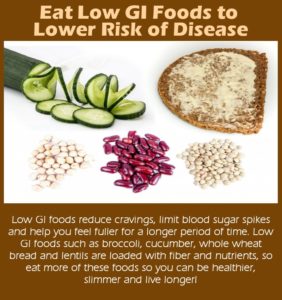Most of us have heard of the Glycemic Index at some time in our lives but quite possibly don’t understand its importance in our quest for better health and a healthy diet.
 These days, with so much information continually thrown at us about health, fitness and diet it is very easy to become confused. There is a lot of good dietary evidence, but there is also a lot of misinformation too which is why it’s so easy to be overwhelmed by information overload.
These days, with so much information continually thrown at us about health, fitness and diet it is very easy to become confused. There is a lot of good dietary evidence, but there is also a lot of misinformation too which is why it’s so easy to be overwhelmed by information overload.
If you are someone who would like to stay healthy by eating right, then it is important to know that a “healthy diet” is made easier when you know a bit about your own body’s chemistry.
To explain what I mean here, we need to become more knowledgeable in evaluating the nutritional value of the foods we eat. To confidently know what to eat and what is best for our own body, we need to know why.
The Importance of the Glycemic Index
One of the first things to be aware of when making food choices is how each different food affects the levels of blood sugar and insulin in our body. This has become a must not only for diabetics but for everyone, due to the over-consumption of easily available foods that contain far too much added sugar.
 Foods that do not have adverse impacts on our blood sugar will keep our moods balanced, provide the right amount of energy and help maintain an ideal weight.
Foods that do not have adverse impacts on our blood sugar will keep our moods balanced, provide the right amount of energy and help maintain an ideal weight.
The problem is, how do we know how much impact a certain food can have on our blood sugar?
This is where we need to be aware of the “glycemic index”.
The Glycemic Index Defined
The glycemic index or GI measures the impact of carbohydrates in our blood sugar.
Carbohydrates that fall in the ‘high GI’ category are those that are too easily broken down to provide a quick release of glucose into our bloodstream.
The Glycemic Index is a very helpful tool in differentiating between good carbs and bad carbs, or more correctly, complex carbs and simple carbs.
Good carbs fall in the ‘low glycemic’ range which means they are foods that are easily broken down by the body in a slow and steady manner. This process keeps blood sugar and insulin levels more stable.
On the other hand, carbs that are classified in the ‘high GI’ category are rapidly converted to blood glucose, triggering a panic insulin release rather than a measured steady response.
The insulin quickly ‘sweeps’ the glucose from the blood, some of which becomes body fat.
The excess insulin release depletes the blood’s glucose to a sub-normal level. The lower than normal blood glucose causes fatigue and the brain responds by inducing hunger symptoms in an attempt to restore normal levels.
This causes us to reach for a dietary ‘quick-fix’, usually more high GI carbs, and the unhealthy cycle continues.
The Glycemic Index was originally created to help diabetics control their blood sugar and insulin levels, however, nutritional experts realize that the Glycemic Index can be a helpful tool for everyone, not just diabetics.
Making Wise Food Choices
The Glycemic Index is in no way the single determinant of what is good food or otherwise.
Foods that are considered to be ‘high GI’ are not all villains while ‘low GI’ foods are not all excellent sources of nutrition.
In addition to classifying foods according to their GI, the nutritional content of each food must be considered. In other words, common sense must be used in conjunction to consulting the Glycemic Index and it should not be used as a sole basis for making wise dietary choices.
In this video you can find the TOP 10 Foods that do NOT affect your blood sugar.
I’m sure you have heard this one before – we are what we eat. So eating the level of GI foods that are compatible with your lifestyle and bodily requirements will go a long way in improving your overall health and vitality.
Cheers – John. Don’t forget to like and share.
Leave a Reply